
Thomism is the philosophical and theological school which arose as a legacy of the work and thought of Thomas Aquinas (1225–1274), the Dominican philosopher, theologian, and Doctor of the Church.

The Pontifical University of Saint Thomas Aquinas (PUST), also known as the Angelicum in honor of its patron the Doctor Angelicus Thomas Aquinas, is a pontifical university located in the historic center of Rome, Italy. The Angelicum is administered by the Dominican Order and is the order's central locus of Thomist theology and philosophy.

Luis de Molina was a Spanish Jesuit priest, theologian and jurist follower of Second scholasticism of the School of Salamanca. A staunch defender of free will in the controversy over human liberty and God's grace. His theology is known as Molinism.

The Summa Theologiae or Summa Theologica, often referred to simply as the Summa, is the best-known work of Thomas Aquinas (1225–1274), a scholastic theologian and Doctor of the Church. It is a compendium of all of the main theological teachings of the Catholic Church, intended to be an instructional guide for theology students, including seminarians and the literate laity. Presenting the reasoning for almost all points of Christian theology in the West, topics of the Summa follow the following cycle: God; Creation, Man; Man's purpose; Christ; the Sacraments; and back to God.
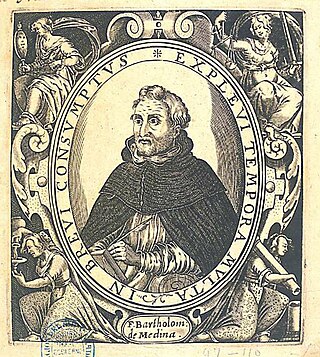
Bartolomé de Medina, O.P. (1527-1580) was a Spanish theologian born in Medina de Rioseco, Spain. A member of the Dominican Order and a student of Francisco de Vitoria, he was professor of theology at the University of Salamanca and a member of the School of Salamanca. He is best known as the originator of the doctrine of probabilism in moral theology, which holds that one may follow a course of action that has some probability, even if the opposite is more probable.

Gregory of Valencia was a Spanish humanist and scholar who was a professor at the University of Ingolstadt.

The Congregatio de Auxiliis was a commission established by Pope Clement VIII to settle a theological controversy regarding divine grace that had arisen between the Dominicans and the Jesuits towards the close of the sixteenth century. It was presided over for a time by Peter Lombard, Archbishop of Armagh.
Hervaeus Natalis, also known as de Nédellec, was a Dominican theologian, the 14th Master of the Dominicans, and the author of a number of works on philosophy and theology. His many writings include the Summa Totius Logicae, an opusculum once attributed to Thomas Aquinas.
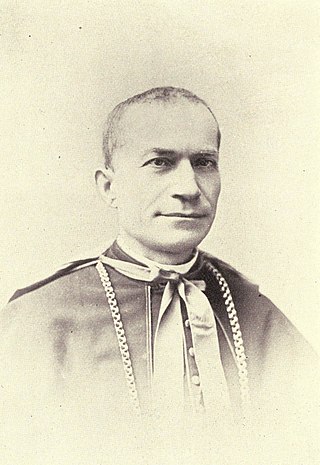
Francesco Satolli was an Italian theologian, professor, cardinal, and the first Apostolic Delegate to the United States.
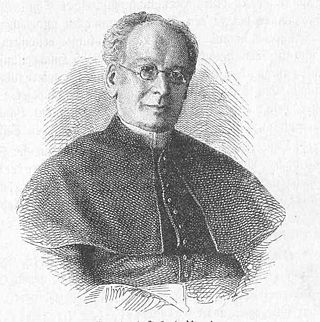
Giuseppe Pecci was a Jesuit Thomist theologian whose younger brother, Vincenzo, became Pope Leo XIII and appointed him a cardinal. The Neo-Thomist revival, which Leo XIII and his brother Giuseppe, Cardinal Pecci originated in 1879, remained the leading papal philosophy until Vatican II.
Francisco de Araujo was a Spanish Catholic theologian.

Domingo Báñez was a Spanish Dominican and Scholastic theologian. The qualifying Mondragonensis sometimes attached to his name seems to refer to the birthplace of his father, Juan Báñez, at Mondragón in Guipúzcoa.
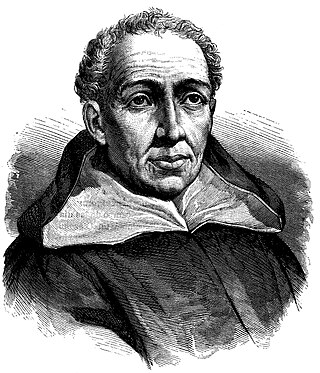
Tomás de Lemos (Thomas) was a Spanish Dominican theologian and controversialist.
Philip of the Blessed Trinity was a French Discalced Carmelite theologian and missionary.
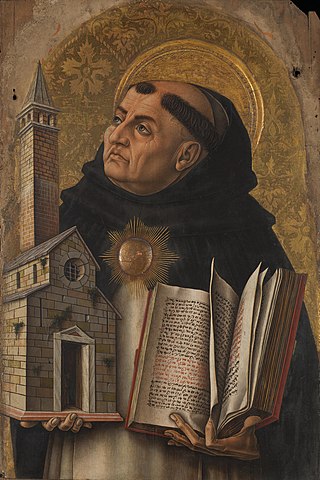
Thomas Aquinas was an Italian Dominican friar and priest, an influential philosopher and theologian, and a jurist in the tradition of scholasticism from the county of Aquino in the Kingdom of Sicily.

Servais-Théodore Pinckaers OP was a noted moral theologian, Roman Catholic priest, and member of the Dominican Order. He has been especially influential in the renewal of a theological and Christological approach to Christian virtue ethics.
Conrad Koellin was a Dominican, professor of theology, and commentator on St. Thomas Aquinas.

Treatise on Law is Thomas Aquinas' major work of legal philosophy. It forms questions 90–108 of the Prima Secundæ of the Summa Theologiæ, Aquinas' masterwork of Scholastic philosophical theology. Along with Aristotelianism, it forms the basis for the legal theory of Catholic canon law.

Spanish philosophy is the philosophical tradition of the people of territories that make up the modern day nation of Spain and of its citizens abroad. Although Spanish philosophical thought had a profound influence on philosophical traditions throughout Latin America, political turmoil within Spain throughout the 20th century diminished the influence of Spanish philosophy in international contexts. Within Spain during this period, fictional novels written with philosophical underpinnings were influential, leading to some of the first modernist European novels, such as the works of Miguel de Unamuno and Pío Baroja.

Aniceto Fernández Alonso OP was a Spanish Catholic priest and the Master of the Order of Preachers from 1962 to 1974.














